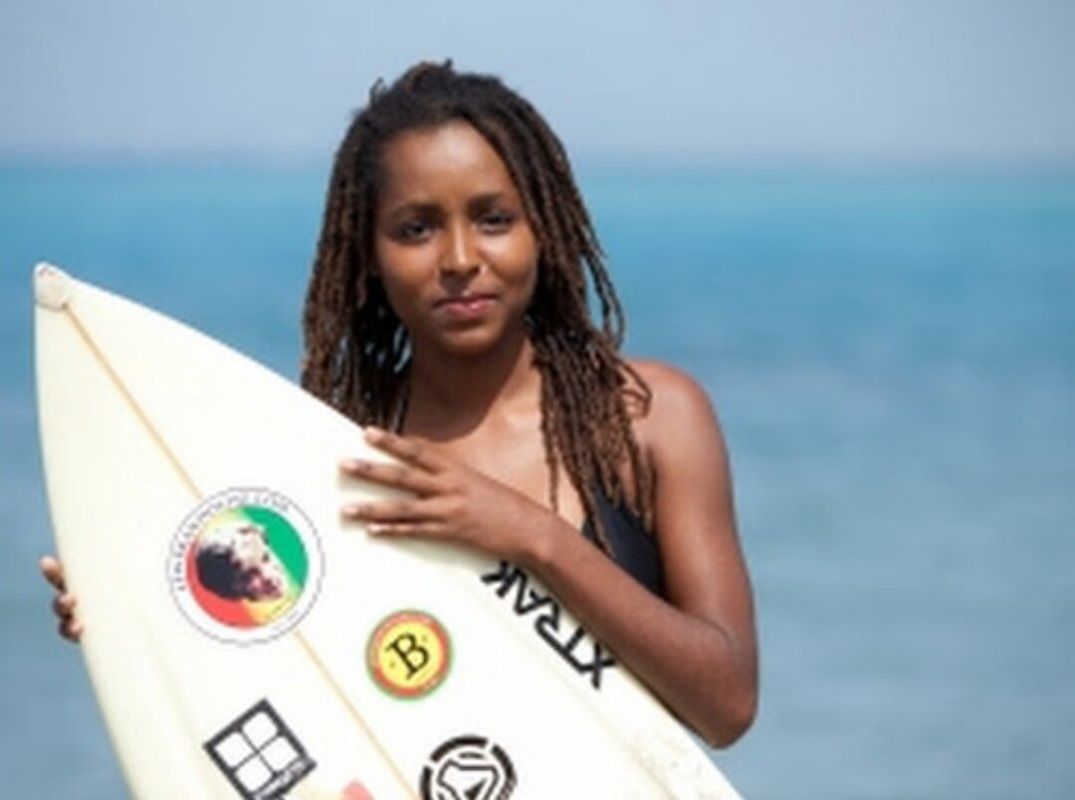Surfer, Imani Wilmot always has confidence when she rides the waves. She is known across the world to snag medals in her favourite pas time. Now she wants create the same safe space for younger girls to share their life experiences and feel safe in the water as she teaches them to surf.
In the bright blue Caribbean waters around Jamaica there is an intriguing change taking place. There are women riding the waves and they are getting a lot out of it.
Urging them on is Imani Wilmot, Jamaica’s top female surfer and for a long time, one of only a handful of girls to be in the sea until she decided to do something about it.
Surfing has always been a part of her life. Her father, Billy Wilmot was one of the sport’s pioneers in the island nation and the founder of the Jamaican Surfing Association.
Growing up with the godfather of Jamaican surfing, Imani’s childhood, she says, was very fun.
‘I enjoyed every bit of it. I didn’t really start surfing till I was about seven or eight years old and honestly I started out of jealousy.’
Only jealous because her brothers started surfing before her.
‘I would always watch them and see how much fun they were having and one day I was like, I want to try now, it’s my turn.’
Having a surfing pioneer for a father and brothers that loved to hit the waves had its perks.
‘My brothers taught me how to surf with my father. They were very supportive but they didn’t spoil me. Despite being the only girl, once I got the basics of it and I could catch my own waves and started to do well, they just said, listen you have to do this for yourself now.
They said, we’re not going to baby you. If you want to get strong and better, you have to do the hard work.’

At that time, surfing was so new to Jamaica, that when people saw them with surf boards, they would ask if they were going skiing. Nobody had a clue what it was even though they were surrounded by the sea.
In fact, most Jamaicans can’t swim according to Imani.
‘It’s something the world doesn’t realise. There are few people who do swim and do enjoy the water but most Jamaicans, even ones that go to the beach, they tend to sit at the edge and they don’t really want to go where the sea is rough.
‘Personally, I think it goes all the way back to that fear from being on ships during the slave trade. I think a part of it is it’s just in our DNA to be fearful of being in the water.
If you can think about people just being put into ships journeying across the water but also those who survived to tell the tale of all the horrific things that happened on the ships, it was so traumatic that it is easy to pass down fear of the water. It’s natural for that fear to be there.’
And that’s why I take girls who are scared of the water and try to slowly encourage them into surfing. I do recommend they learn how to swim because I am not a swimming teacher, but once you’re comfortable in the water then you’ll realise how healing the water actually is.’
Being the only black female and first surfer at a point in time of Jamaica’s history in the sport, serving in the national team, Imani had it cut out for her when she competed.
‘I stood out in surfing and I owe a lot of that to my brothers because they really pushed me and motivated me to just try my best. And one of the things my father explained to me when I was much younger is that being a girl in this sport, that is mostly full of boys, you’re going to have to be twice as good to even get half the recognition because that’s how the system is set up. So just having that as well as the positive support of my family, I just started getting really good.’
One thing though did make her sad about being the only black Jamaican girl surfer at the time.
‘It was sad when you’d look me up and I’d be the only one on google because I was also looking out there to see if there are any other girls like me that I could talk to, that I could be friends with when we go to these competitions and I wasn’t seeing that. That’s when I decided that if I wanted to have a community that I can reach out to, I have to create the community.’
At age 17 she set up her first surf camp to teach girls to surf.
‘It was really good. The girls really enjoyed it and one of them still surfs today. That has just grown from that to now where there are about 30 of us who surf. We are committed to the sport and we do love it.’

The surf camps have become a lot more about surfing. They are also a safe space to be yourself with women and girls and to share experiences, often bad ones.
‘What people don’t realise is that you need a community to thrive. You need to feel safe, you need to feel empowered, you need to feel that somebody cares about what you’re thinking, your ideas, and your dreams. Just by creating that space for these girls and these women to come and experience being in the water together, there’s a calm. Just knowing that there’s somebody there to listen whenever you need it.’
Her surf camps act as a form of therapy for women and girls in Jamaica going through what Imani describes as a harsh culture. The harsh culture she talks about is one where girls feel pressured to engage in sexual activities from a very early age and some men objectify women in society.
‘I’m not going to say it’s everywhere in Jamaica but it’s common enough you could see it as a cultural issue. The way that men deal with women here and the type of attitudes and attention that they will give to little kids, young girls, especially if their bodies are more physically developed, it can be very hard to deal with.
There are a few women in the group who have experienced sexual assault and just being in the water in a caring environment and also being able to have the time to go inside themselves and really process things they are experiencing.
It really does heal a lot of things.’














